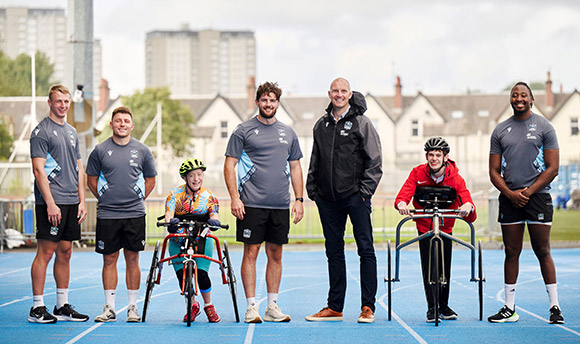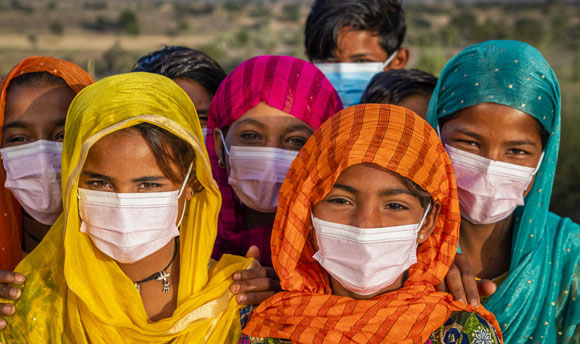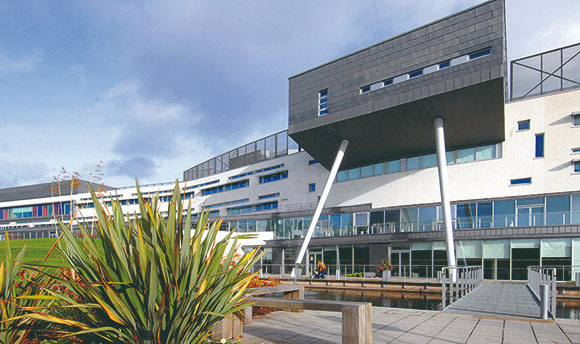Safeguarding in Research and Knowledge Exchange (KE)
QMU is committed to a research and KE culture where all those engaged in research and KE activities are safe from harms including exploitation, harassment, and abuse.
As a signatory to the Concordat to Support Research Integrity all individuals employed, participating and otherwise engaged in the University’s research and KE must be treated with dignity and respect and activities must be undertaken to the highest standard of integrity.
The University recognises its duty of care for staff, students, participants, and external parties conducting research and/or KE activities on behalf of the University as well as communities impacted either directly or indirectly by these activities.
QMU commits to ensuring collaboration agreements and/or contracts reflect funder requirements with respect to safeguarding in research and KE activities.
As part of our commitments outlined above, the QMU Research Culture Group, in collaboration with colleagues from across the University, developed guidance for Safeguarding in Research and KE. The Guidance was considered and approved by the Research Strategy Committee in February 2024 and by Senate in March 2024.
The guidance should be considered and implemented in conjunction with relevant QMU policies and codes of practice, and external legislation, as specified in the document. The key QMU policy documents can be accessed on the right-side panel.
Principal Investigators are reminded that, as part of the contracting process, they are accountable for disseminating these policies to research partners and participants, ensuring their practical implementation, and monitoring research activities as part of their grant management and reporting responsibilities.
Queen Margaret University (QMU) Safeguarding in Research and Knowledge Exchange (KE) Guidance (2024)
For the purpose of this guidance, QMU adopts the UK Collaborative on Development Research (UKCDR) (2020) definition of safeguarding as “preventing and addressing any sexual exploitation, abuse or harassment of research participants, communities and research staff, plus any broader forms of violence, exploitation and abuse… such as bullying, psychological abuse and physical violence”.
This Guidance is to be referred to as part of wider QMU Safeguarding Policy and Procedure, currently under development.
This guidance applies to:
- QMU staff, students and any individuals engaged by the University to conduct research and KE activities.
- Research participants and any communities or individuals involved in the University’s research and/or KE activities.
- All QMU research and KE activities regardless of geographical location i.e. whether located in UK or internationally.
QMU recognises that research and KE activities may occur in nations and/or organisations whose regulatory/legislative requirements differ from its own. On those occasions where the partner legislation must take precedence, Principal Investigator’s (PI) are required to clearly document the rationale of the benefits of research / KE activity and develop a relevant Risk Assessment and Mitigation Protocol, as per QMU research ethics procedures, laying out specific safeguarding measures for the planned research / KE activity. These arrangements must be clearly recorded and approved through the University ethics procedures. Ethical approval can only be granted by the appropriate research ethics committee if such conditions are met. Depending on the project and level of risk involved, this would be the University Research Ethics Committee (UREC) or Divisional Research Ethics Committee (DivREC). To ensure the highest standards of safeguarding in international research and KE activities, all researchers should be familiar with the UKCDR Guidance on Safeguarding in International Development Research.
QMU staff and students are always expected to personally act to the highest standards with regard to safeguarding, as detailed in the University’s Safeguarding Policy, Procedure and Framework. However, it is recognised that we cannot impose our own internal policies/procedures on our research and KE partners, which is why dialogue is encouraged amongst our partners around this issue.
This Guidance on Safeguarding in Research and KE aims to ensure that any concerns, complaints or allegations are directed to and dealt with by the most appropriate existing University policy or procedure or external legal requirements. Therefore, it must be read in conjunction with other relevant policies and codes of practice, including:
- QMU Safeguarding Policy, Procedure and Framework
- QMU Protection of Vulnerable Groups Policy, including provisions for Assessment of Criminal Convictions
- QMU Research Ethics Policy
- QMU Overseas Travel Safety Guidance
- QMU Whistleblowing Policy
- QMU Promoting Dignity in Work and Study Policy
- QMU Anti-Bullying and Harassment (students)
- QMU Staff Disciplinary Policy and Procedure
- QMU Grievance Policy and Procedure
- Service User and Carer Involvement Framework
- Regulations Governing Discipline
- Fitness to Study Policy and Procedure
- Fitness to Practise Policy: Healthcare Programmes
- Fitness to Practise Policy: Initial Teacher Education
QMU policy framework has been developed in response to, and sits alongside, relevant legislation, including:
- UKRIO Code of Practice for Research
- UKRIO Procedure for Investigating Misconduct in Research
- The Prevent Duty
- Trusted Research
- Adults with Incapacity Act, 2000
- Adult Support and Protection Act, 2007
- Children (Scotland) Act 1995
- Children’s Hearings (Scotland) Act 2011
- Children and Young People (Scotland) Act 2014
- Criminal Justice (Scotland) Act 2003
- Data Protection Act 2018 Counterterrorism and Security Act 2015
- Domestic Abuse (Scotland) Act 2018
- Equality Act, 2010
- Human Rights Act 1998
- Protection of Vulnerable Groups (Scotland) Act, 2007
- Protection from Abuse (Scotland) Act 2001
- Protection of Children and Prevention of Sexual Offences (Scotland) Act 2005
- Public Interest Disclosure Act 1998
- Public Sector Equality Duty, 2011
- Scottish Specific Duties, 2012
- Sexual Offences Act, 2009
- United Nations Convention on the Rights of the Child
The University’s Responsibilities
QMU is committed to taking all reasonable steps to prevent harm in its research and KE activities. These responsibilities include ensuring that:
- The appropriate policy, and supporting procedures are in place and made available to researchers to ensure prevention of harm in all research and/or KE activities.
- There is regular review of safeguarding policies, procedures and guidance to incorporate feedback and lessons learned. Period of review is detailed on the cover page of this guidance.
- There is clear definition of expectations regarding conduct of staff, student and/or any other individuals associated with research and KE activities.
- Clear and well-defined reporting and investigation mechanisms for safeguarding concerns relating to research and KE activities using the most relevant investigatory/disciplinary procedure(s) to the concern raised are in place.
- Due consideration is given to funders’ requirements in terms of approach to investigations, onward reporting and, where legally required, the undertaking of relevant safeguarding checks e.g., the Prevent Duty, Safeguarding Vulnerable Groups Act 2006.
Individuals' Responsibilities
QMU recognises that all staff, students and any associated personnel directly engaged in research and KE activity have a role to play in preventing exploitation, abuse or harm by anticipating and mitigating risks associated with the activity, and by reporting concerns or incidents if they do occur (refer to ‘Reporting’ section).
QMU expects staff, students and any associated personnel directly involved in research and KE activity to:
- Treat each other, research and KE participants, and all external stakeholders with dignity and respect.
- Act with the highest standards of integrity, honesty, and professionalism, and to embed good practice in every aspect of their work.
- Adhere to the highest standard of research ethics, in line with requirements set out by national and international regulatory bodies, professional and regulatory research guidance, and research ethics frameworks issued in appropriate areas.
- Recognise the inherent power imbalances that exist in research and KE endeavours and take all reasonable steps to redress this within individual partnerships and collaborations.
- Engage in equitable partnerships throughout the design, delivery and execution of research and KE activities to avoid exploitative approaches.
- Ensure awareness of relevant policies and procedures and know how to respond to and report concerns about exploitation, abuse and harm.
- Assess risks involved in a proposed research project.
- Where risks are identified, include in ethics applications a Risk Assessment and Mitigation Protocol laying out appropriate safeguarding measures for the planned research / KE activity, including clear reporting mechanisms, that should be adopted if safeguarding concerns are disclosed or observed during research or KE activities. Where research is being conducted with partner organisations or institutions, this should include a protocol for timely communication of safeguarding concerns and actions to be taken to ensure these are logged and acted upon as necessary and in a timely manner. This should include identification of key contact people with safeguarding responsibilities.
- Raise any safeguarding concerns, in a timely manner, through the appropriate channels, as per guidance within the Reporting section below.
QMU will investigate all reports that anyone involved in QMU research or KE activity is being harmed or is at risk of being harmed, and all allegations that a member of staff or student might have or has exploited, abused or harmed another member of staff, student, associated personnel, research/KE participants or members of public. This will be investigated within the parameters set out in the University’s Safeguarding Policy, Procedure and Framework.
To facilitate this, all members of the QMU research community, as specified within the scope of this guidance, who identify a safeguarding concern must act upon it and bring it to the University’s attention without delay. The concern may be about a member of the University staff or students, or about an individual/organisation, external to QMU with whom a member of staff or student is engaged as part of their role in research.
If the matter is urgent, and is criminal in nature, a concern should be reported to the police (by telephone 999 or in person at any police station).
If a concern about a member of staff, student or research participant arises out of hours, and needs to be addressed urgently, the University Security should be contacted by calling 0131 474 00 00 or 2222 (ext).
In all other cases, the procedures, as specified below, should be followed.
In case of any questions or uncertainty whether something constitutes a safeguarding in research and KE concern, guidance can be sought through the confidential inbox managed by Research and Knowledge Exchange Development Unit (RKEDU) (researchintegrity@qmu.ac.uk). A dedicated RKEDU team member will offer general guidance regarding sector best practice and provide advice in line with the relevant policy and procedure and/or legal and statutory obligations, including funder requirements. If applicable, advice will also be given regarding appropriate support.
Reporting process for staff
In the first instance, reports regarding concerns associated with safeguarding in research and KE activities should be brought to the attention of the relevant Research Centre Director (RCD) or nominated representative. Should this be inappropriate, e.g. due to conflict of interests or power dynamics, staff should raise concerns in relation to safeguarding in research and KE through the University’s Report and Support System for staff. A report through the Report and Support System can be made either anonymously or through sharing contact details.
This guidance strongly encourages that the person reporting a safeguarding concern does provide their contact details as concerns expressed anonymously are much less powerful. It may be difficult to provide feedback where a concern has been raised anonymously and action to investigate the concern could be limited.
Under the QMU Whistleblowing Policy, anonymous complaints will be investigated or acted upon, as the designated person sees fit, having regard to whether or not the matter being reported is a ‘qualifying’ disclosure. To be protected as a Whistleblower under the Public Interest Disclosure Act, and in the context of this Safeguarding in Research guidance, any disclosure made must, in a person’s reasonable belief, show one or more of the following (paragraph numbering extracted from the Whistleblowing policy):
- that a criminal offence has been committed, is being committed or is likely to be committed;
- that a person has failed, is failing or is likely to fail to comply with any legal obligation to which they are subject;
- that the health or safety of any individual has been, is being or is likely to be endangered;
- that information tending to show any matter falling within any one of the preceding paragraphs has been, is being or is likely to be deliberately concealed.
When working in the context of international research, the University acknowledges that reporting mechanisms need to be flexible to adapt to cultural and contextual differences encountered within the global research and KE arena. In such cases, PIs and partners will be expected to develop a detailed Risk Assessment and Mitigation Protocol laying out specific safeguarding measures for the planned research / KE activity, including reporting mechanisms, in line with QMU research ethics procedures. This will be subject to review and approval by the UREC or Divisional Ethics Committees, as appropriate. When approved, the reporting mechanisms, as outlined within the mitigating protocol, should be used.
Reporting process for students
In the first instance, reports regarding concerns associated with safeguarding in research and KE activities should be brought to the attention of the relevant Head of Division, Head of Graduate School or nominated representative. Should this be inappropriate, e.g. due to conflict of interests or power dynamics, students should raise concerns in relation to safeguarding in research and KE through the University’s Report and Support System for students. A report through the Report and Support System can be made either anonymously or through sharing contact details.
This guidance strongly encourages that the person reporting a safeguarding concern does provide their contact details as concerns expressed anonymously are much less powerful. It may be difficult to provide feedback where a concern has been raised anonymously and action to investigate the concern could be limited.
Under the QMU Whistleblowing Policy, anonymous complaints will be investigated or acted upon, as the designated person sees fit, having regard to whether or not the matter being reported is a ‘qualifying’ disclosure. To be protected as a Whistleblower under the Public Interest Disclosure Act, and in the context of this Safeguarding in Research guidance, any disclosure made must, in a person’s reasonable belief, show one or more of the following (paragraph numbering extracted from the Whistleblowing policy):
- that a criminal offence has been committed, is being committed or is likely to be committed;
- that a person has failed, is failing or is likely to fail to comply with any legal obligation to which they are subject;
- that the health or safety of any individual has been, is being or is likely to be endangered;
- that information tending to show any matter falling within any one of the preceding paragraphs has been, is being or is likely to be deliberately concealed.
When working in the context of international research, the University acknowledges that reporting mechanisms need to be flexible to adapt to cultural and contextual differences encountered within the global research and KE arena. In such cases, Supervisors / Directors of Studies and partners will be expected to develop a detailed Risk Assessment and Mitigation Protocol laying out specific safeguarding measures for the planned research / KE activity, including reporting mechanisms, in line with QMU research ethics procedures. This will be subject to review and approval by the UREC or Divisional Ethics Committees, as appropriate. When approved, the reporting mechanisms, as outlined within the mitigating protocol, should be used.
Reporting process for participants, stakeholders and members of public
Research participants (other than QMU staff or students), stakeholders and members of public should use the QMU Report and Support System to report any safeguarding concerns.
Reporting concerns to research funders
If your research is funded by a third party, it is likely that there will be an expectation from them that details of any proven Safeguarding Concerns are brought to their attention. For example, UKRI state in their guidance:
“If, following investigation, the allegation of exploitation, abuse or harm against an individual directly involved in UKRI-funded activity is upheld, the organisation must notify UKRI of the investigation and the decision in a timely manner.”
If this is the case, it is the PIs responsibility to timely bring any safeguarding concerns to the funder’s attention.
Addressing safeguarding concerns
Once a safeguarding in research and KE concern has been raised, in order to determine the best course of action in line with the relevant policy and procedure, guidance should be sought by contacting one of the key safeguarding contacts below:
Staff – Head of Human Resources (Angela Smith, ASmith2@qmu.ac.uk)
Student – Head of Student Services (Jessica Lindohf, JLindohf@qmu.ac.uk)
External parties including funders, research participants and general public – Research Integrity Lead, RKEDU (researchintegrity@qmu.ac.uk)
An independent, expert and confidential advice on the conduct of research, including poor practice and misconduct, can be accessed from the UK Research Integrity Office using the UKRIO enquiry form.
Support
Support is available for those who have been affected by a Safeguarding Concern if they wish to access it.
Staff have access to the University’s Employee Assistance Programme (MCL Medics), which offers professional support and guidance to QMU staff relative to challenges colleagues may be facing at work or at home, including support for mental health and emotional wellbeing.
In addition, support is available from the following:
- Health, Safety and Wellbeing Service
- Human Resources Service
- Helping Distressed Students – a Guide for Staff
Students have access to a range of support services including:
- Counselling Service
- Wellbeing Service
- Togetherall – online support platform for mental health
- Disability Service
- Student Funding Service
- Personal Academic Tutor (PAT)
- QMCares – support for Care Experienced Students, Student Carers, and Estranged students.
Staff working within Student Services, in particular in the Counselling and Wellbeing team, are experienced in responding to safeguarding concerns, either raised directly by students themselves, or by other members of the University community.
Staff in the Students Union (SU) offer confidential support and guidance through their Help Zone. There’s information on the SU website, and you can contact them at union@qmu.ac.uk
The University recognises the importance of safeguarding in research and KE activities and as such, matters related to safeguarding in research and KE activities will be added as a standing agenda item at each Research Governance Steering Group and University Research Ethics Committee to allow oversight and visibility of this important matter.
All safeguarding reports will be considered and monitored by the RGSG, which will provide strategic leadership in relation to monitoring, responding to, addressing and reporting non-compliance and poor practice in research and KE.
This guidance and associated process will be reviewed annually, or more frequently in the event of legislative changes, which will allow for evaluation of effectiveness and review of feedback.
Progress in compliance with Safeguarding in Research and KE UK best practice will be reported in the Annual Concordat to Support Research Integrity statement which is submitted to University Court and published on our website.
Guidance Issue Date: 13 March 2024 (approved by QMU Senate)
Last reviewed: September 2024
Next review due: September 2025
A range of training is available to staff fulfilling key roles in relation to safeguarding and related aspects of duty of care. This includes safeguarding training, health, safety and wellbeing at QMU training; prevent duty training; equality and diversity and a wider range of mandatory Health and Safety training. Colleagues can access these opportunities via QMU Develop. Training dedicated to research integrity and safeguarding is also available through annual Researcher Development and Training Programme.
Additionally, a short course titled Introduction to International Safeguarding is available through QMU curriculum. The course explores fundamental principles of safeguarding, planning, response, and good practice when overseas.
Externally, the UK Collaboration on Development Research (UKCDR) has a range of useful training resources, including:
Additional references relating to safeguarding in research and KE activities are found below:
- UK Collaborative on Development Research (UKCDR) Guidance on Safeguarding in International Development Research,
- UKCDR Webinar: “Preventing Harm in Research”,
- UK Research and KE (UKRI) Preventing Harm in Research and KE Policy,
- National Institute for Health and Care Research (NIHR) Policy on preventing Harm in Research,
- NIHR Safeguarding Guidance,
- CHSAlliance Guidelines for Investigations,
- Social Research Association (SRA) Code of Practice for the Safety of Social Researchers,
- National Protective Security Agency (NPSA) Trusted Research,
- BOND Safeguarding Resources,
- All European Academies (ALLEA) The European Code of Conduct for Research Integrity.
Definitions below are adapted from UKRI Preventing harm (safeguarding) in research and innovation policy (2020).
‘Abuse’ is any action that violates a person’s human or civil rights. This can take the form of physical harm, sexual, emotional or psychological abuse. This can also include financial or material abuse and neglect.
‘Associated personnel’ means any person directly involved in a QMU research and knowledge exchange activity who is not the organisation’s staff or student, including, but not limited to:
- staff or students from partner organisations, contractors, consultants, collaborators, fieldworkers,
- volunteers etc who are named on the grant;
- those whose posts are partly or wholly funded through a QMU held grant;
- those whose services are procured through the QMU held grant;
- those whose salaried time is partially or wholly contributed to the QMU held grant, as an in-kind contribution from an organisation;
- those whose time is volunteered to complete specific activities identified in the QMU held grant.
‘Child’ in line with the United Nations Convention on the Rights of the Child, and for the purposes of this policy, is defined as any person – girl, boy, young woman, young man and children of other gender identities—under the age of 18 years. This definition supersedes any national legislation on age of majority/consent.
‘Bullying and harassment’ means any unwanted behaviour that makes someone feel intimidated, degraded or offended. It can include a continuum of repeated behaviours that convey hostility, force unwanted attention, objectification, exclusion or second-class status, and has negative effects on the targeted person where they may find it difficult to defend themselves, for example, because of a hierarchical relationship with the perpetrator.
‘Exploitation’ is any actual or attempted abuse of a position of vulnerability, differential power or trust for the purposes of gaining benefit, including, but not limited to, monetary, social or political gain.
‘Exploitation, abuse and harm’ is a term used to encompass the range of offences covered by this policy, including sexual exploitation, abuse and harassment, bullying, psychological abuse and physical violence.
‘Harm’ is any detrimental effect on psychological, physical or emotional wellbeing and any other infringement of an individual’s rights. Harm may be caused by abuse or exploitation, whether intended or unintended.
‘Psychological harm’ means emotional or psychological abuse, including, but not limited to, humiliating and degrading treatment such as name calling, constant criticism, belittling, persistent shaming, solitary confinement and isolation.
‘Research and knowledge exchange activity’ means any activity funded through a grant, including, but not limited to, research and knowledge exchange projects, networking grants, seminar series/workshop/conference grants, fellowships, doctoral training programmes, institutional block awards allocated to research organisations, other institutional strategic awards.
‘Research participant’ means any individual that participates in human subject research by being the target of observation by researchers.
‘Safeguarding’ means taking all reasonable steps to prevent harm, particularly sexual exploitation, abuse and harassment from occurring; to protect people, especially children and vulnerable adults from that harm, and to respond appropriately when harm does occur.
‘Safeguarding in research’ means preventing and addressing any form of exploitation, abuse or harassment of research participants, communities and research staff, plus any broader forms of violence, exploitation and abuse, such as bullying, psychological abuse and physical violence.
‘Sexual abuse’ means the actual or threatened physical intrusion of a sexual nature, whether by force or under unequal or coercive conditions.
‘Sexual exploitation’ means any actual or attempted abuse of a position of vulnerability, differential power or trust for sexual purposes, and includes, but is not limited to, profiting monetarily, socially or politically from sexual exploitation of another.
‘Sexual harassment’ means any unwelcome sexual advances (including, but not limited to, sexual advances made without touching) and includes, but is not limited to, requests for sexual favours or other verbal or physical behaviour of a sexual nature which may create a hostile or offensive environment.
‘Staff’ means an individual employed by QMU who is directly involved in a QMU research or knowledge exchange activity or application for funding.
‘Student’ means an individual studying at QMU who is directly involved in QMU research or knowledge exchange activity or application for funding.
‘Victim/survivor’ means an individual who has been exploited, abused or harmed as defined in this policy.
‘Violence’ means all forms of physical violence, injury or abuse.
‘Vulnerable adult’ means a person who is or may be in need of care by reason of mental or other disability, age or illness, and who is or may be unable to take care of themselves or is unable to protect themselves against significant harm or exploitation.
The Guidance should be considered and implemented in conjunction with relevant QMU policies and codes of practice, and external legislation, as specified and signposted within the 'Scope of Guidance' section.
Principal Investigators, as part of the contracting process, are accountable for disseminating these policies to research partners and participants, ensuring their practical implementation, and monitoring research activities as part of their grant management and reporting responsibilities.







